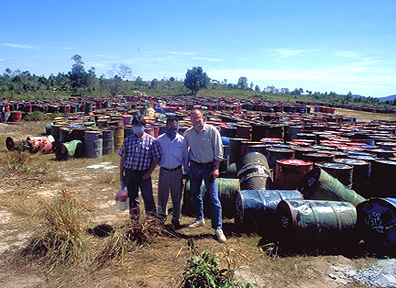 (c) Basel Action Network PRESS RELEASE
The environmentalists called "irresponsible" those reports which claimed that no immediate danger was posed by the dumping, especially as the known levels of mercury are extremely high, and very few of the other possible toxic contaminants have yet to be tested. And they noted that even the tests that have been made were from far too few samples to adequately represent the entire dump "We find it shocking that some authorities have already jumped to the conclusion that the wastes posed no threat while comprehensive chemical analysis and health studies have yet to be conducted," said Von Hernandez of Greenpeace International. "This is especially irresponsible in light of the known deaths and sickness that have already been associated with the waste. The appropriate response in view of the lack of information is to take all precautionary measures to protect the public," he said. While one recently revealed study performed in Hong Kong has shown a sample of the waste to have a mercury level as extremely high as 10,971 ppm (over 1%), no studies have been performed on the many possible toxic substances such as pesticides, dioxins, furans, polycyclic aromatic hydrocarbons and all organic forms of mercury. Likewise, tests for possible damage from acute exposures to the immune system, nervous system and kidney disorders of those exposed have yet to be undertaken. The groups further expressed fears that the difficulty in finding third countries to accept the hazardous wastes would be used as an excuse by Formosa Plastics to indefinately delay re-export of the wastes. They called for a firm deadline to be imposed by which time the wastes must be removed and returned to Taiwan. Finally, Greenpeace and BAN called for a fast-track approach to implementing a full ban on the import of hazardous wastes into Cambodia, and ratification of the international Basel Convention and that treaty's amendment banning hazardous waste trafficking from rich to poorer countries. They brought model legislation to Cambodia and presented it to Environment Minister Mok Mareth and Deputy Prime Minister Sar Kheng in meetings yesterday. At those meetings, both Ministers expressed their full committment to achieving such a ban and Basel ratification at the earliest opportunity. "Cambodia has now had a sad, convincing, demonstration of the fact that the international trade in hazardous waste is not commerce -- it is criminality," said Jim Puckett of the BAN. "There is now no honorable excuse for any politician not to immediately pass legislation banning all forms of hazardous waste imports. For as tragic as this episode has been, the greater tragedy would be if the government sat on its hands and failed to take preventative measures to ensure that such dumping never happens again," he said. Over 100 countries have already banned the import of hazardous wastes. And in Asia, all coastal countries except Taiwan, North Korea and Cambodia have joined the Basel Convention. According to the environmentalists, had Cambodia and/or Taiwan been parties to the Basel Convention, the message that such export would not be tolerated would have been unmistakable and any illegal traffic would have been considered a criminal offense and a violation of international law. For more information:
|
|
|